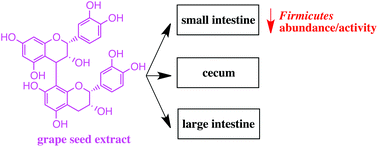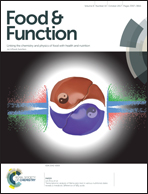Alterations to metabolically active bacteria in the mucosa of the small intestine predict anti-obesity and anti-diabetic activities of grape seed extract in mice
Abstract
Epidemiological and clinical studies suggest that grapes and grape-derived products may reduce the risk for chronic disease. Grape seed extract specifically has been gaining interest due to its reported ability to prevent weight gain, moderate hyperglycemia, and reduce inflammation. The purpose of this study was to examine the long-term effects of two doses of grape seed extract (10 and 100 mg kg−1 body wt per d in mice) on markers of metabolic syndrome in the context of a moderately high-fat diet. After 12 weeks, the lower dose of grape seed extract was more effective at inhibiting fat gain and improving glucose tolerance and insulin sensitivity. Neither the high fat diet nor grape seed extract altered skeletal muscle substrate metabolism. Most interestingly, when examining the profile of metabolically active microbiota in the mucosa of the small intestine, cecum, and colonic tissue, grape seed extract seemed to have the most dramatic effect on small intestinal tissue, where the population of Firmicutes was lower compared to control groups. This effect was not observed in the cecal or colonic tissues, suggesting that the main alterations to gut microbiota due to flavan-3-ol supplementation occur in the small intestine, which has not been reported previously. These findings suggest that grape seed extract can prevent early changes in glucose tolerance and alter small intestinal gut microbiota, prior to the onset of skeletal muscle metabolic derangements, when grape seed extract is consumed at a low dose in the context of a moderately high fat diet.



 Please wait while we load your content...
Please wait while we load your content...